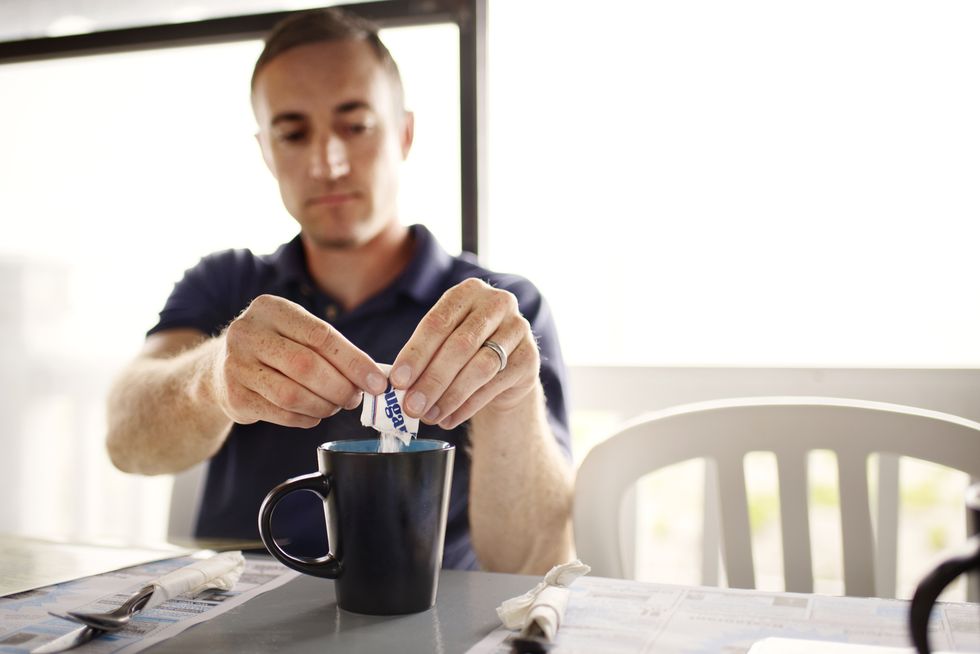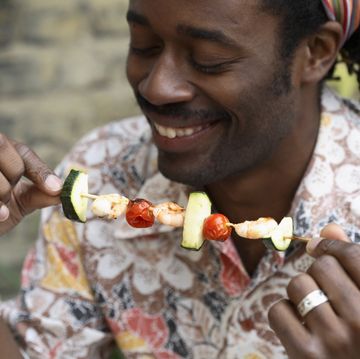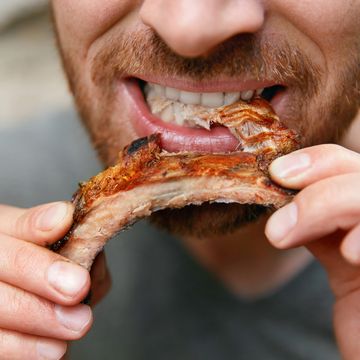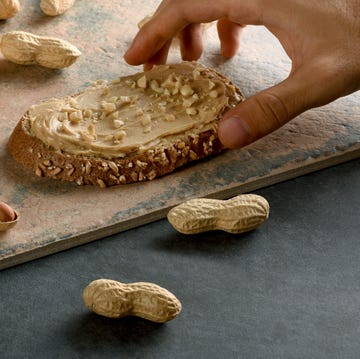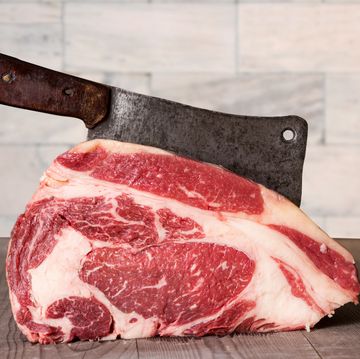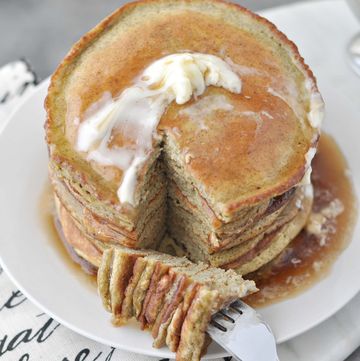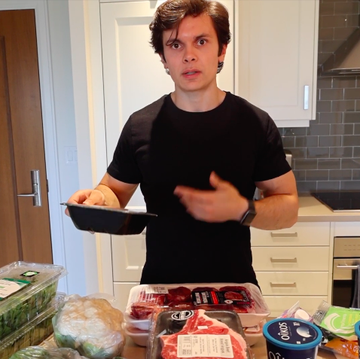IF YOU’VE EMBRACED a keto diet, you’ve probably dedicated plenty of time to menu planning and prep. But here’s one thing you may have overlooked: drinks.
“The keto diet is based on keeping the body in ketosis. When the body doesn't get enough glucose from the diet, it will make it into ketones as a survival mechanism,” says Destini Moody, R.D., C.S.S.D., sports performance dietitian. “When the bloodstream contains enough ketones, the body is said to be in ketosis. Those who advocate the keto diet claim that if you stay in ketosis long enough, your body will burn fat more efficiently, resulting in weight loss. Staying in ketosis requires eating fewer carbs than 50 grams per day.”
You may not often associate drinks with carbohydrates, but what you drink can have more of an effect than you think on maintaining ketosis. For perspective, one standard 16-ounce bottle of Coca-Cola is about 55 grams of carbs. Beverages could get you into trouble, quickly. Still, you don’t want to forget about staying properly hydrated when following a keto eating plan.
“It’s important to stay hydrated during your keto journey because ketosis has a diuretic effect on the body, meaning it’ll make you pee a lot,” says Alyssa Pagila, registered dietitian for Goode Health. When choosing keto-friendly beverages, Paglia recommends avoiding anything that contains added sugars, syrups, or artificial sweeteners as these ingredients can hinder ketosis. Look for unsweetened options or those with natural calorie-free sweeteners like stevia or monk fruit extract.
Sorry to be the bearer of bad news, but this means “beer is out of the question as it is fermented from wheat which is, you guessed it, a carb,” Moody says. Keep reading for guidelines on keto-friendly drinks and which beverages to avoid on the keto diet.
What You Can Drink on Keto
There are a variety of drinks that get the green light on a keto diet. These include water, unsweetened coffee and tea, unsweetened plant-based milks, and low-carb protein shakes.
First, let’s start with the most basic drink of all. “Water is an essential part of any healthy diet, and is especially important on a keto diet to help flush out toxins and support hydration,” says Pallini Winnifred, R.D.N., of FitDominium. Sparkling water is fair game, too. As Winnifred notes, it’s a refreshing alternative to plain water and it’s usually low in carbs, “making it a good choice for a keto diet.” Still, she says, be sure to choose a brand that is unsweetened and has no added flavors or sweeteners (whether natural or artificial) to keep the beverage keto-friendly.
Coffee and tea drinkers are also in luck. So long as it’s unsweetened, you can feel free to stick to your hot or iced cup whatever routine. “Both coffee and tea are low in carbs and can be enjoyed on a keto diet as long as they are unsweetened,” says Winnifred, noting that adding a bit of dairy milk or cream is fine as long as you stay within your daily carb limit.
For those following a keto diet, feel free to drink unsweetened plant-based milks, too. “Nut milks, such as almond or cashew milk, can be a good source of healthy fats on a keto diet,” says Winnifred. “Coconut milk is a good source of healthy fats on a keto diet, and can be used as a milk substitute in coffee or as a base for smoothies.”
With all of these types of plant-based milks, again, select a brand that is unsweetened and has no added sugars or carbs. Unsweetened soy milk is another great alternative to dairy milk and you won't have to cash in on your carbs. A cup of unsweetened soy milk contains just four grams of carbs. Like almond milk, stay away from flavored varieties.
You may also be wondering about protein shakes. Low-carb protein shakes are fine if you’re on a keto diet, and a convenient way to slip in extra protein to your daily routine. As with other beverages, Winnifred says to look for a brand that doesn’t use additional sugars for flavors. Ditto for brands that have added carbs.
Looking for a tasty, quick A.M. snack that’s keto friendly? Mike Israetel, a sports nutrition consultant and former professor of exercise science at Temple University in Philadelphia, says low-carb chocolate protein powders make a great addition to coffee instead of a traditional mocha.
But not all protein powders are low in carbohydrates, so you'll have to check the label.
Israetel recommends a powder that contains casein protein, which is digested slowly to help you stay full longer. Or, you could try a protein powder formulated to be nearly carb-free for keto dieters.
What You Can’t Drink on Keto
“There are several types of drinks that should be avoided on a ketogenic diet due to their high carbohydrate and sugar content,” says Winnifred, noting that these drinks can disrupt ketosis and make it more difficult to achieve the desired health benefits of the diet.
First, steer clear of sugary drinks. Winnifred shares that this category includes sodas, energy drinks, and other sweetened beverages that are high in added sugars and carbs. “These types of drinks can cause a rapid increase in blood sugar, which can disrupt ketosis and lead to weight gain,” she says.
Fruit juices ought to be avoided, too. “While fruits themselves can be a part of a healthy keto diet in moderation, fruit juices should be avoided due to their high sugar content,” says Winnifred. “Most fruit juices are made from concentrate and are high in added sugars, which can disrupt ketosis and increase the risk of health issues such as diabetes and heart disease.”
Most fruit juices are high in carbohydrates (usually and overwhelmingly sugar carbs), which makes them almost impossible to drink on the keto diet, says Israetel.
Case in point: An 8-ounce ounce of cranberry juice has 30 grams of carbs. Apple juice? That's roughly 24 grams of carbs.
That said, there are diet or reduced sugar juices that contain minimal carbohydrates, making them good keto-friendly drinks.
These products are packaged similarly to the full-calorie versions, so Israetel says you'll need to read the nutrition label to ensure your juices are really low-carb.
Milk is another drink that doesn’t get the keto stamp of approval. “While small amounts of milk may be acceptable on a keto diet, it is generally high in carbs and should be consumed in moderation,” says Winnifred, adding that if milk is included in a keto diet, choose one of the low-carb varieties discussed in the previous section, such as almond milk or coconut milk.
One note if you do decide to drink dairy milk while following a keto diet: Whole milk is your best bet thanks to its fat content—eight grams of fat per cup. While plain milk (so, not chocolate) doesn't contain added sugars, lactose is a sugar naturally found in dairy milk. That means a one-cup serving contains 12 grams of carbs.
As for sports drinks, these should be nixed from a keto diet as well. “Sports drinks are high in carbs and are designed to replenish glycogen stores after intense exercise,” says Winnifred. “They are not necessary for most people on a keto diet and should be avoided.”
What about alcohol? Hardcore keto followers may want to avoid happy hour altogether, as alcohol "stops fat loss dead in its tracks," Israetel says. Drinking alcohol temporarily bumps you out of ketosis.
If you really want to celebrate that job promotion or toast your best friend's wedding, opt for the hard stuff, like vodka and whiskey (on the rocks or with club soda). Wine and beer tend to be higher in carbs.
You can also try your hand at making your own low-carb, keto-friendly cocktail.
If you do choose to drink, limit consumption to occasional use, says Winnifred.
What’s Complicated
In general, Winnifred stresses the importance of being mindful of the carb and sugar content of any drink that you consume on a ketogenic diet. “Choosing drinks that are low in carbs and have no added sugars can help support ketosis and the potential health benefits of the diet,” she says.
Still, some drinks defy strict categorization and require a bit more of a nuanced examination. As Winnifred puts it, there are some drinks that are ‘more complicated’ when it comes to whether or not they are acceptable on a ketogenic diet. “These drinks may be okay in moderation, or may be acceptable as long as certain criteria are met.”
Certain kinds of juices fall into this arena. “While most juices are high in carbs and should be avoided on a keto diet, some juices made from low-carb vegetables, such as spinach or cucumber, may be acceptable in moderation,” says Winnifred. “It is important to check the label and choose a juice that is low in carbs and has no added sugars.”
As do coffee and tea with added sweeteners. “While unsweetened coffee and tea are generally acceptable on a keto diet, adding sweeteners such as sugar or honey can increase the carb content and disrupt ketosis,” offers Winnifred. If you do choose to add sweeteners to your coffee or tea, choose a low-carb option, such as stevia, and limit your intake of these sweetened beverages, says Winnifred.
Avoid sugar and artificial sweeteners in your beverages as much as possible, but if you must add something sweet to your coffee or tea, opt for plant extracts such as stevia or xylitol, which may have fewer unhealthy side effects than sugar. (Read more about sugar vs. sweeteners here.)
Instead of going this route, consider matcha. It’s great for people who miss their favorite sugary coffee shop drinks. Double-check the label to avoid added sugars, but many brands offer low-carb matcha mixes.
Lastly, let’s take a moment to look at smoothies. These beverages often have a health halo around them, but the truth is, many are laden with sugar and excess carbs. Smoothies from your favorite mall are most definitely not keto-friendly—they're loaded with sugar.
Our rule of thumb: If you make them at home or order them at a health food store or smoothie chain with nutrient-dense ingredients, beverages on our “what you can have” list, and no added sweeteners, they’re likely ok. To make a keto-friendly smoothie at home, choose a low-carb base like unsweetened almond milk, and mix in match or protein powder, lots of ice, and a small amount of fruit (a half-cup of blueberries, for example, contains 10 grams of carbs).
5 Keto-Approved Drinks That Aren't Water
They're all strong sources if you're looking to keep ketosis in check.
Black Coffee
“Not only does black coffee contain certain antioxidants that may decrease risk for chronic disease, but many considering the keto diet can breathe a sigh of relief that we aren’t taking away your morning caffeine ritual,” says Moody. If you add sweeteners or flavored creamers to your coffee, you’re adding carbs and the drink is no longer keto-friendly. That means no lattes, frappuccinos and café mochas.
Amber Dixon, R.D., of Elderly Guides, says coffee “can help boost metabolism, enhance physical performance, and may even help you stay in ketosis.”
Black or Green Tea
Black and green tea are beverages high in polyphenols, powerful antioxidants that have been shown to help reduce harmful bodily inflammation. Plus, “these beverages are naturally sugar- and carb-free as long as you’re okay with enjoying them plain with no sugar added,” Moody says.
Green tea is a beverage that's not only low in carbs but also has potential health benefits. “It contains bioactive compounds that can improve health, and studies suggest it may increase fat burning and boost metabolic rate, which aligns well with the objectives of a keto diet,” says Dixon.
Almond Milk
We’re talking about the unsweetened kind here, folks. “Unsweetened almond milk is a great keto-friendy option that is naturally low in carbohydrates. It is also a good source of healthy fats, vitamins, and minerals that can help reduce your risk of nutritional deficiencies,” says Pagila. Check the label before purchasing almond milk to make sure there are no added sugars or other sneaky ingredients that could kick you out of ketosis.
In addition to drinking almond milk on its own, Moody says keto dieters can pour it on their carb smart cereal, add it to coffee, or mix their protein powders in to cut down on carbs without sacrificing flavor. Unsweetened almond milk also makes a great base for smoothies.
Matcha
Unsweetened matcha is keto-friendly as it is naturally carb-free.
“It is also an excellent source of antioxidants and has been linked to numerous health benefits including boosting metabolism, supporting heart health, and enhancing cognitive function,” Paglia says. Another bonus of matcha, is that it “contains caffeine and amino acids that can boost your energy levels.”
Bone Broth
In addition to being compatible with a keto diet, bone broth is also brimming with nutrients, per Dixon. “It's rich in minerals and vitamins, it can help repair the gut lining, support joint health, and also provide a good source of protein,” she says.


